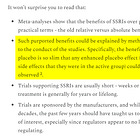The placebo effect - becoming "more elusive and out of control"
The other day I wrote an article sharing some thoughts about nocebo and placebo effects:
This comment underneath drew to my attention this interesting paper:
The abstract reads as follws:
Background
Placebo response appears to be increasing in antidepressant, antipsychotic and various internal medicine trials. A similar trend has been reported for OCD during 1989-1999. Placebo response is generally considered as the extent to which placebo treatment is associated with core symptom improvement. In this analysis, we used Joinpoint regression to assess the time trend of both placebo response and placebo responder rates according to the year of publication with no time restriction in OCD drug trials.
Method
We included drug and/or psychotherapy trials vs. placebo from PubMed, Embase, CINAHL, and PsycINFO retrieved through the search (placebo OR sham) AND (obsessive* OR OCD). We included studies through investigator consensus. We then performed on data of included studies log-linear joinpoint segmented regression models using a p<0.05 cutoff.
Results
We included 113 studies from 112 published papers. Placebo mean annual response rates in OCD studies significantly increased from 1991 to 2017 with an annual percent change (APC) of 0.66%, while placebo mean annual responder rates also significantly increased from 2010 to 2017, with an APC of 5.45%. Drug mean annual response rates in OCD studies significantly increased from 1987 to 2012 with an APC of 0.72%, while the corresponding responder rates did not show statistically significant APC changes between 1984 and 2017.
Conclusion
We observed a tendency for placebo to increase both measures of response in OCD clinical drug trials through the years that tend to approximate the responses shown by drugs. Changes in the type of study (moving from classical head to head comparisons to add-on studies in treatment-resistant populations) and countries involved in experimentation may partially account for some portion of these results. It appears that placebo effects are becoming more elusive and out of control.
I found that quite interesting.
One explanation for this is as follows:
Humanity has bought increasingly more and more powerfully into the belief system that for every symptom there is a pharmaceutical solution.
With that increasing belief brings an increased placebo effect - a person being enrolled into a trial and receiving a product which may be the active one imports benefits independent of the treatment, and the greater the belief in the efficacy of pharmaceuticals, the greater this effect will be.
Moreover, and especially for mental health disorders, people have over recent decades clamoured to receive diagnoses, perhaps to use as justifications for problems in their lives. Inevitably, this has brought many people into the fold of the “unwell who need treatment” who have illnesses which are particularly susceptible to placebo effect.
What do you think?




I have started a placebo company. So far we have "approved" placebos for many mental health conditions, Long Covid (ok that's a mental health condition too), Covid19/flu/common cold/sniffles/"the crud", Monkey pox, and are currently working on "approval" (by us of course) for several more. Our latest and most innovative product is the "VirtCebo" - it's so good that you just have to tell the patient that they've been given a therapeutic agent - no saline needed.
What’s the effect called when the doctor believes that a drug intervention works and won’t test or check it’s actually working in a given individual?